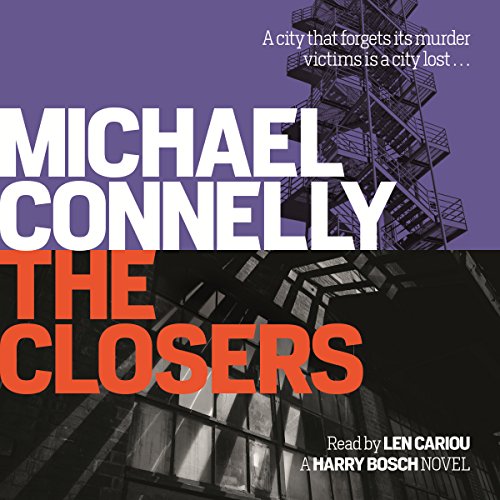The Closers
Authors: Michael ConnellyNarrator: John Chancer
Duration: 12H 00M
My Rating: ⭐⭐⭐⭐🌑
Tags: detective - action - thriller
John Chancer is not my favorite narrator. He lacks those voice from RC Bray or Dick Hill. But it’s still ok to listen if there is nothing else around.
Bosch is back to the police work again investigating very old case. Chasing leads, some politics talk.
Life of people who cannot live over death of their children and freeze in time.
Nothing over-exciting here, no major plot twists or revealing things.
Quotes:
Bosch thought about how many times over the years he had seen someone’s seemingly innocent mistake turn into one of the keys to their own doom. A routine chore to pick up clothes may have led to the opportunity for a killer to get inside the house. Becky Verloren may have unwittingly engineered her own death.
It seemed to him that increasingly the media forced the victims of tragedy to grieve in public, in front of cameras and in newspaper stories. Parents of murdered children became talking heads who appeared on the tube as experts the next time there was another child murdered and another set of parents grieving. It seemed to him that the best way to honor the dead was to keep them close to the heart, not to share them with the world across the electronic spectrum.
Bosch now understood where their daughter had gotten her growing beauty. The mix of races in a child often rose above the attendant social difficulties to achieve such grace.
Panorama City was a district carved off the north side of Van Nuys many years before when residents there decided they needed to distance themselves from negative connotations ascribed to Van Nuys. Nothing about the place was changed but the name and a few street signs. Still, Panorama City sounded clean and beautiful and crime free, and the residents felt better about themselves. But many years had passed and resident groups had petitioned to rename their neighborhoods again and to distance themselves, if not physically then image-wise, from negative connotations associated with Panorama City. Bosch guessed it was one of the ways Los Angeles kept reinventing itself. Like a writer or actor who keeps changing his name to leave past failings behind and start fresh, even with the same pen or face.
The U-boat was a single-officer car primarily used as a gopher for the watch commander.
By labeling Garcia a housekeeper Edgar was saying that Garcia rode his partner’s coattails. Green was the real homicide cop and Garcia was the guy who backed him up and kept the murder books tidy and up to date. A lot of partnerships got sanded down into such relationships. An alpha dog and his assistant.
It was at times like this that Bosch thought about smoking again. It always seemed to make the time go faster and it took the edge off the anxiety that always built through a surveillance. But it had been more than four years now and he didn’t want to break stride. Learning two years earlier that he was a father had helped him get past the occasional weaknesses. He thought that if not for his daughter he’d probably be smoking again. At best he had controlled the addiction. By no means had he broken it.
Bosch looked around the room at the crowded tables. He didn’t know where he would sit. He knew that these sorts of chow halls had the same unspoken protocols as prisons. Add in the high degree of mental illness in the homeless population and you could be crossing some sort of line just by the seat you chose.
Whether intentionally or not, Verloren was communicating to Bosch that his new life had been achieved through the intervention of faith. Bosch had often found that those who talked about it the most had the weakest hold on it.
The first building they passed was the federal office building, and Bosch noticed that the concrete barriers erected in 2001 to keep potential vehicle bombs away from the building were still in place. The threat of danger didn’t seem to bother the people in the line stretching across the front of the building. They were waiting to get into the immigration offices, each clutching paperwork and ready to make a case for citizenship. They waited beneath the tile mosaics on the front façade that depicted people dressed like angels, their eyes skyward, waiting on heaven.
Bosch looked at Rider and she leaned forward to answer. This was her show. He was just there as a backup and to send the message to the judge that this one was important. Cops had to be lobbyists on occasion.
It was a carefully designed answer that would put a lot of pressure on the judge to sign the authorization. After all, she was an elected official. She had to consider the ramifications of her turning down the application. If Mackey committed a crime that could have been stopped had the police been listening to his phone calls, the judge could be held responsible by an electorate that wouldn’t care much about whether she had been trying to safeguard Mackey’s personal rights.
